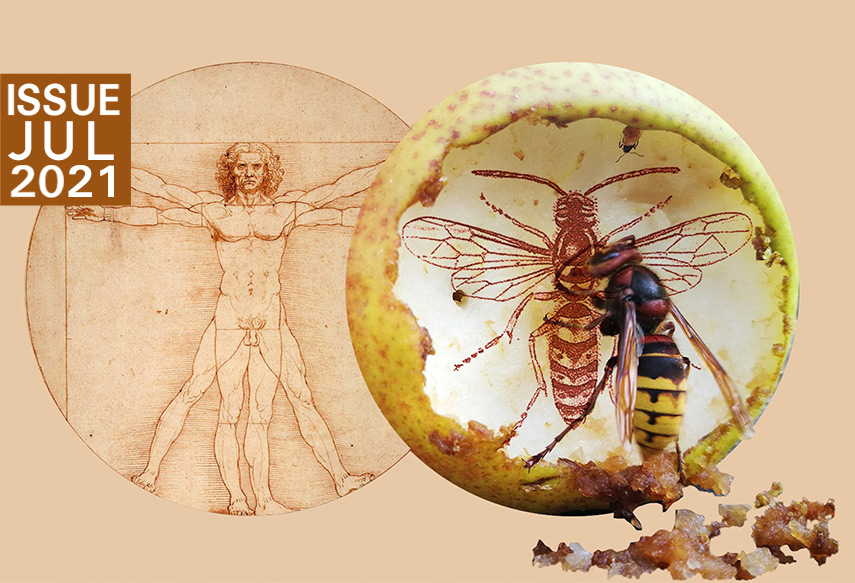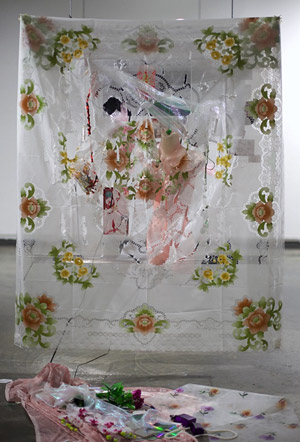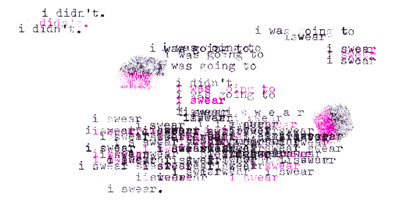- Featuring
- Lêdo Ivo Olivia Elias
- Bruno Latour
- Gabriel Payares
- Hoda Barakat and Hwang Sok-yong A Conversation about Diversity and Literary Translation
“Like being given permission to divulge a wonderful secret”—this is how Paul Filev describes translating the talented but lesser-known writer Gabriel Payares. After a hiatus in spring, we’re back with wonderful secrets from thirty-five countries and a bold lineup that includes Hoda Barakat, Can Xue, Bruno Latour, and Lêdo Ivo, confirming “we all live in a beautifully round world.” More than any other issue in recent memory, “Age of Division,” our Summer 2021 edition, also speaks to the current divisiveness of our times.
In Ethiopian writer Mulugeta Alebachew’s short story, childhood memories are betrayed when the narrator returns home after a long time away only to find his friends “intently drawing family trees and working out the ethnic background of people as if they worked for the cartography agency, and it was their task to draw boundaries.” Meanwhile, at a “time of infinite sadness,” diasporic Palestinian poet Olivia Elias speaks to us about “a life in the eye of the hurricane” and of “a country / engulfed in a fault of history.”
Sometimes it takes an outsider to see a country’s divides. This is the case in Lusine Kharatyan’s fiction comprising tweet-sized vignettes delivered in a brilliant deadpan, such as this zinger of an opening: “After 9/11, my American family decided to learn about other cultures. This is how I appeared in their home. I tell them about Armenia, they tell me about the Chinese guy they hosted before me.” It is also the case in Hwang Sok-yong’s memoir, in which he tells us of his return to North Korea “some forty-odd years after pretending to leave on a picnic”—but only after recounting at length his visit to a divided Berlin in 1985. In Aitor Romero Ortega’s “Bridges of Bosnia,” the post-war divisions of what used to be Yugoslavia provide a backdrop to the disconnect between a visiting Spanish couple.
Capturing in words and photos what he sees in the streets of Caracas, Pedro Plaza Salvati snaps us back to our pandemic reality, reminding us that divisiveness can stem from the seemingly mundane decision of whether or not to wear masks. (Hatem Al-Zahrani’s poem, on the other hand, is a dazzling and sensuous ode to the Ordinary whose beautiful face it has taken “a deadly virus with no cure” to reveal.)
A name such as Abdushukur Muhammet’s in Sweden can be cause for ”unverbalised anguish” even as it recalls the “circular naan” of the poet’s homeland. For Bouchaib Gadir, however, names are a contested site of exile—that most painful of divisions: “When you live in a country that does not resemble you, / Your name becomes: Those ones.” Newly transplanted in Brooklyn, Chinese artist Zi Yi Wang recalls being “pulled between Eastern and Western ideologies . . . [longing] for belonging and identification”; as a result, both hybridity and a sense of history inform her beautiful assemblages of trash. Also an assemblage of sorts, Marius Ivaškevičius’s staging of historical figures like Chopin and Balzac in conversation with one another suggests that belonging can yet be cultivated on foreign soil. All of this is fittingly illustrated by Slovak collagist Vladimír Holina.
I’d be remiss if I didn’t point out my three personal highlights from the issue: Gitanjali Patel and Nariman Youssef’s “All the Violence It May Carry on its Back: A Conversation about Diversity and Literary Translation” continues the Brave New World Literature Special Feature first published in the Winter 2021 issue and fleshes out the very real challenges faced by non-white literary translators, for whom “reading in multiple languages does not have to be an act of generosity or curiosity; some of us have existed with multiplicity all our lives.” Though a piece of criticism, Vesna Goldsworthy’s clear-eyed review of Miloš Crnjanski’s A Novel of London contains insights worthy of a Brave New World Literature essay: not only does she invoke Danish scholar Cay Dollerup’s observation that most translation from small languages is “an imposition” on the wider anglophone world, she also wryly describes the fruit of such a translator’s labor as an “unwanted gift.” Finally, the philosopher and social scientist Bruno Latour talks about his writing process—something he has never done before—his enchantment with Kafka, and how language must adapt to the new realities brought about by climate change.
We have an announcement for those who have new work they want to share with a truly global audience: Our new submission policy since March now guarantees a one-month turnaround. (Meanwhile, here’s why we have decided to stop considering Singaporean work.) Subscribe to our newsletter, follow us on Facebook, Twitter, and our two Instagram accounts, and make sure to bookmark our blog for a daily window on world literature. With access to featured authors or translators via monthly Zoom sessions, our Book Club will take your reading to the next level for as little as USD15 a month. Finally, a gentle reminder that this “global literary miracle” (Dubravka Ugrešić) can only be sustainable if enough supporters get involved in our mission. It only takes three minutes to sign up for fabulous perks, including a 2021 Brave New World Literature ebook! We can’t wait to welcome you to the Asymptote family.
—Lee Yew Leong, Editor-in-Chief
Editorial Team for Issue July 2021
Editor-in-Chief: Lee Yew Leong (Taiwan/Singapore)
Assistant Managing Editors: Daljinder Johal (UK/India), Malak Khalil (UK), Marina Martino (UK), Samuel Miller (Portugal/USA), Janet Philliips (UK/Australia), and Lindsay Semel (Portugal/USA)
Section Editors:
Lee Yew Leong (Taiwan/Singapore)
Bassam Sidiki (USA/Pakistan)
Caridad Svich (USA/UK)
Sam Carter (USA)
Eva Heisler (USA)
Editor of Special Feature “Age of Divison”: Lee Yew Leong (Taiwan/Singapore)
Assistant Editors: Alyea Canada (USA), (Canada), Whitney DeVos (Mexico/USA), Sabrina Greene (USA), Shawn Hoo (Singapore) Barbara Halla (France), Maya Nguen (USA), Andreea Scridon (UK/Romania), and Lin Chia-wei (Taiwan)
Contributing Editors: Ellen Elias-Bursac (USA), Aamer Hussein (UK), Sim Yee Chiang (Singapore), Dylan Suher (USA), and Adrian West (USA)
Translation Tuesdays Editor: Lee Yew Leong (Taiwan/Singapore)
Art Director: Lee Yew Leong (Taiwan/Singapore)
Director, Educational Arm: Kent Kosack (USA)
Editors-at-large, Argentina: Sarah Moses
Editor-at-large, El Salvador: Nestor Gomez
Editor-at-large, Guatemala: José García
Editors-at-large, Hong Kong: Jacqueline Leung and Charlie Ng Chak-Kwan
Editor-at-large, Japan: David Boyd
Editor-at-large, Lebanon: MK Harb
Editor-at-large, Palestine: Carol Khoury
Editor-at-large, Romania and Moldova: MARGENTO
Editor-at-large, Serbia: Jovanka Kalaba
Editor-at-large, Slovakia: Julia Sherwood
Editors-at-large, Taiwan: Vivian Chih and Darren Huang
Editor-at-large, Uzbekistan: Filip Noubel
Editors-at-large, Vietnam: Thuy Dinh and Quyen Nguyen
Masthead for Issue July 2021
Fiction, Poetry, Special Features, and Interview: Lee Yew Leong
Nonfiction: Bassam Sidiki
Drama: Caridad Svich
Criticism: Sam Carter
Visual: Eva Heisler
Interview: Lee Yew Leong
Illustrations and Cover: Vladimír Holina
Assistant Managing Editor (supervising issue production): Janet Phillips
Assistant Managing Editors (supervising Assistant Editors): Lindsay Semel and Marina Martino
Assistant Managing Editor (supervising Editors-at-Large): Daljinder Johal
Chief Executive Assistant: Rachel Farmer
Senior Executive Assistants: Bernice Seow and Julie Shi
Executive Assistants: Soren Smallwood, Ka Man Chung, and Angela Bulgari
Blog Editors: Allison Braden, Sarah Moore, and Xiao Yue Shan
Newsletter Editor: Lee Yew Leong
Guest Artist Liaison: Berny Tan
Senior Copy Editors: Anna Aresi, Rose Green, and George Macbeth
Copy Editors: Alice Banks, Andrea Blatz, Bella Bosworth, Sophie Hoffman, Samantha Kirby, Rachel Rosenberg, and Rachel Stanyon
Technical Manager: József Szabó
English Social Media: Ruwa Alhayek, Geoffrey Ballinger, Georgina Fooks, and Felipe Fernandez
Spanish Social Media: Sergio Serrano, Sofia Monzó, and Madeline Robinson
French Social Media: Filip Noubel
Chinese Social Media: Jiaoyang Li and Jessica Wang
Graphic Designers: Renée Elizabeth Clarke and Michael Laungjessadakun
Communications Manager: Julian Strachan
Marketing Manager: Ivana Galapcheva
Director, Educational Arm: Kent Kosack
Educational Arm Assistants: Katarzyna Bartoszynska, Lucchini Clémence, Mary Hillis, Thirangie Jayatilake, and Anna Rumsby
Book Club Manager: Alexandra Irimia
Intern: Teodora Ugowa
Asymptote would like to acknowledge the support especially of: Nicholas Wong, Maya Osborne, Karen Lockwood, and Lucie M. Taylor.
For their generous donations, our heartfelt thanks go too to Alexander Dickow, Benjamin Saff, Chris Tanasescu, Christina Kramer, Dana Delibovi, Daniel Hahn, Ellen Elias-Bursac, Phan Nhiên Hạo, Gary Gach, Hilda Castillo, Ian Chung, Jeffrey Boyle, Jenna Colozza, Katarzyna Bartoszynska, Lara Norgaard, Lauren Beck, Mallory Truckenmiller, Marilyn Veteto, Marjolijn de Jager, Mark Cohen, Martin Ingebrigtsen, Martin Orwin, Matthew Mazowita, Meng Xiangxiu, Monty Reid, Nhi Ta Huong, Philip Feinsilver, Tamara Atanasova, Ulf Jacobsen, Velina Manolova, William Cadwallader.
We welcome new members of the Asymptote family Thomas Carroll, Mo O'Mahony, Janet Phillips, Yvonne Koh, and Marcelene Isaacson!



